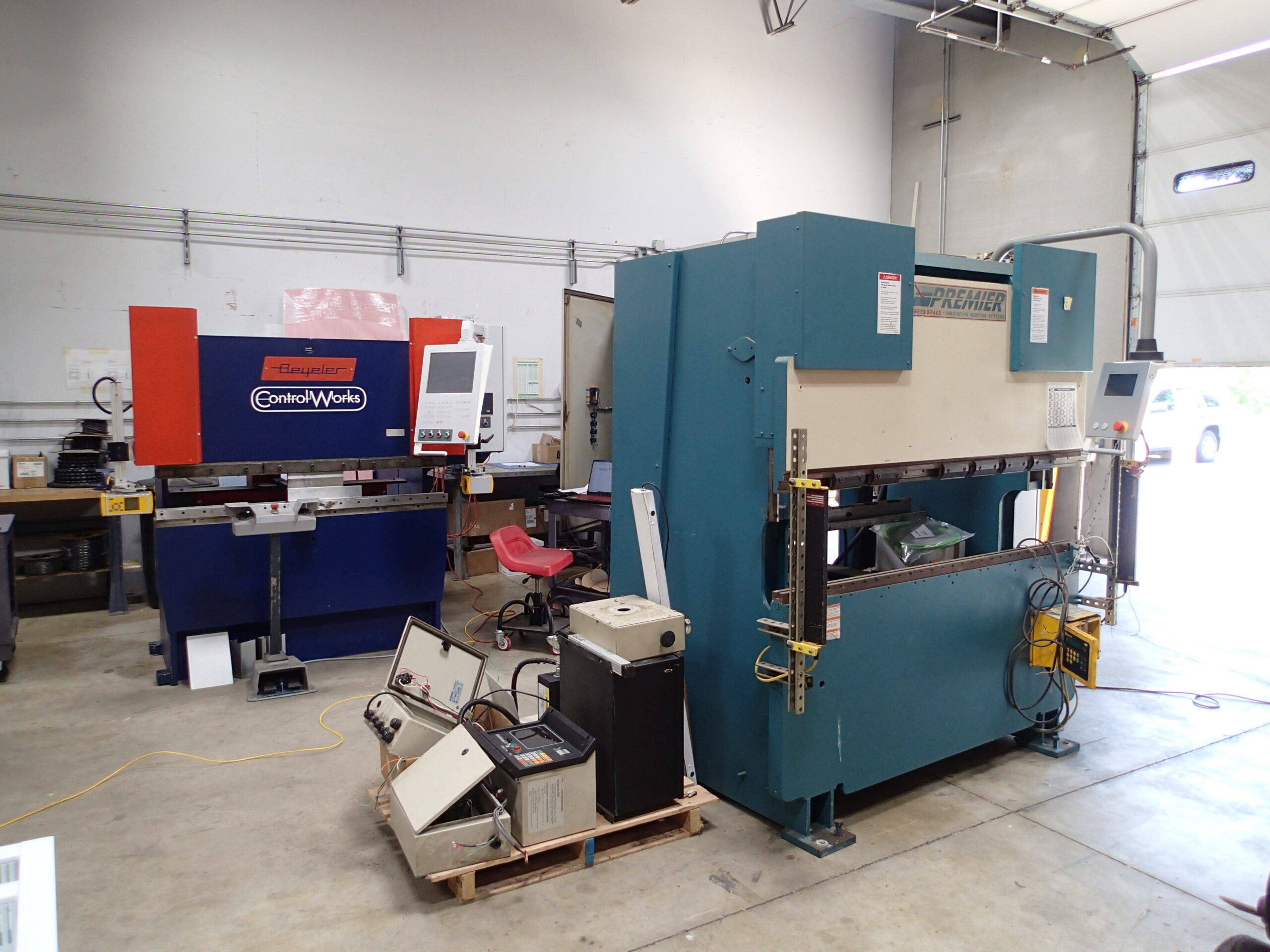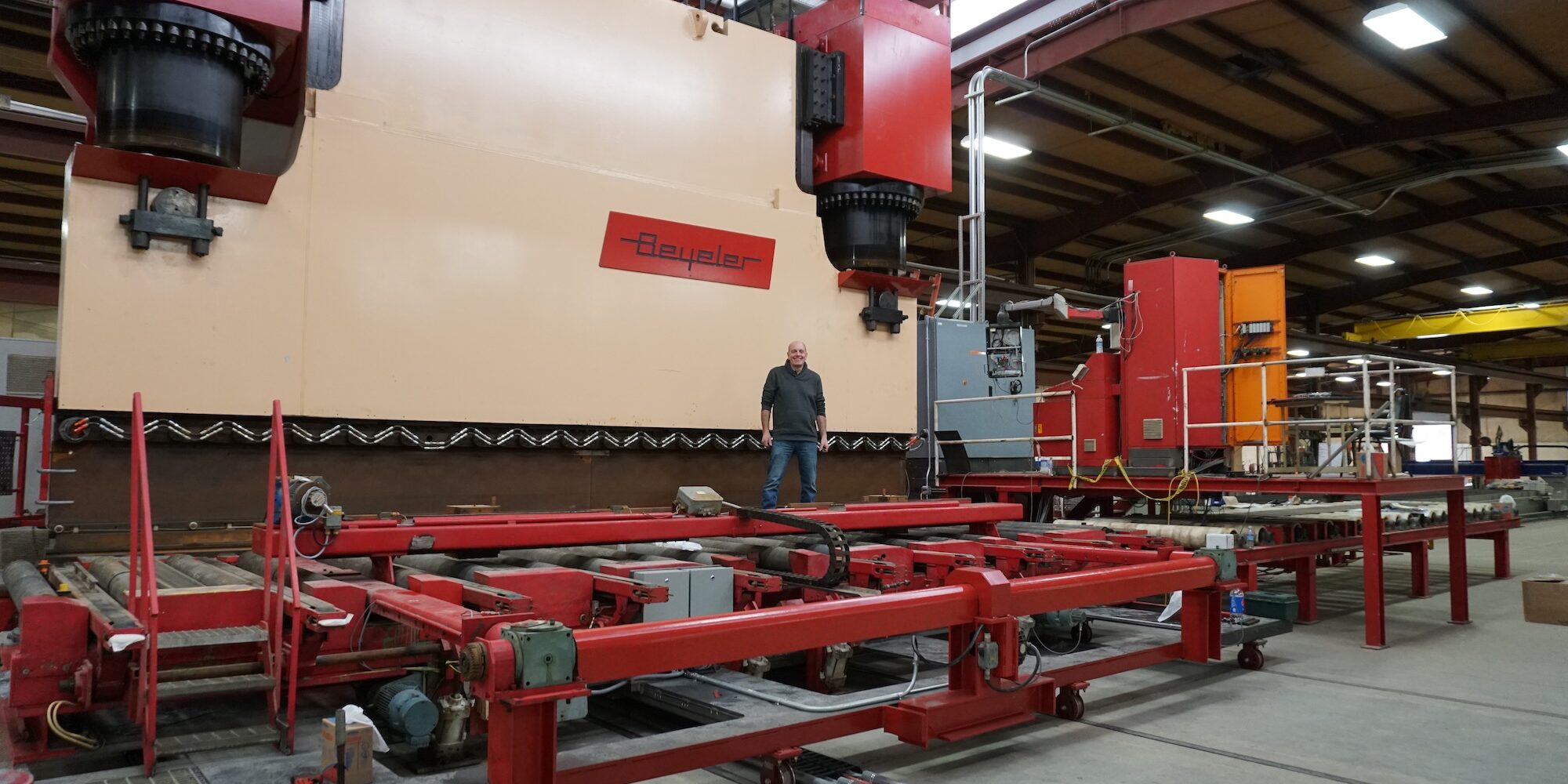David Cossey is one of two owners of Control Works, a control systems and press brake service company.
This blog is an interview with David C., providing some insight into the Press Brake Division of Control Works.
David highlights some of his background, how he helps clients, and his thoughts on the future of press brake servicing.

You don’t have a very strong Chicago accent. How did you end up in Chicago doing press brakes for companies?
“I began my career in Bradford, England, working for an aerospace company where I assembled and repaired actuation systems for military aircraft and missile guidance modules. While the technical nature of the work was intriguing, the clean room environment was less appealing to me, prompting a transition to an internal maintenance technician role. In this position, I was responsible for repairing CNC machinery used to manufacture precision components.
During that time, I interacted frequently with factory service technicians and became drawn to the dynamic nature of their work, particularly the opportunity to travel. This led me to join a Belgian press brake manufacturer as a service technician based in the United Kingdom.”
“My career subsequently afforded me the chance to travel extensively throughout the UK, Europe, and other international destinations. Eventually, seeking greater stability, I accepted a position with a Swedish-based company that maintained a facility in my hometown. When an opportunity arose to support the company’s expansion in the United States, I accepted and relocated.
In 2005, I elected to establish my own business. During this period, I met David Locke while collaborating on a project. Our shared expertise led us to merge our businesses, and I now oversee the press brake division, managing retrofits, repairs, training, and service operations.”
“We’re one of the few service providers in the country offering complete electrical solutions, from supplying integrated panels to programming safety PLCs, Servo drives, and safety systems.”
How did companies hear about your services and decide to hire you instead of a larger company?
“By the time I launched my own business, my reputation had already spread. Several customers I’d worked with across the United States reached out directly when they learned I was leaving my previous company. Much of my work since then has come through word-of-mouth recommendations.
In the service industry, the size of the company is far less important than the quality and expertise of its people. Clients aren’t concerned whether you operate solo or as part of a large team; what matters most is your ability to deliver reliable solutions when others cannot.”

How do you help clients determine what they need?
“Typically, a customer’s needs guide the process. I rarely recommend a full retrofit unless the machine’s control system is completely obsolete, meaning it can’t be repaired or sourced for parts. In those cases, I’ll advise considering a new control solution.
Whenever possible, I focus on repairing equipment if I believe it will remain reliable over the long term. However, if I anticipate growing challenges with ongoing maintenance, I’m upfront with clients, letting them know they may need to start making decisions as it becomes harder to keep the machine operational.”
Do you maintain relationships with all your customers?
“Some companies are a one-off service call, but there are many businesses that routinely call me for all their service requirements. For the businesses that I maintain relationships with, I’m happy to provide telephone assistance when they’re having minor issues that they can repair themselves.”

What is the most challenging job you’ve had to overcome with rebuilding or repairing a press brake?
“Over the years, I’ve probably rebuilt almost every part you can imagine on a press brake, though thankfully, never all on the same machine at the same time. Some jobs have involved major undertakings, like moving the controls from one side to the other, which is no small feat. I’ve run into all sorts of complicated issues, but in my experience, the root cause is often something deceptively simple, hidden beneath layers of complexity. It’s a process of peeling things back until you find what’s actually wrong.
One job stands out, though. A customer’s machine had a persistent issue that stumped everyone. After spending an entire day troubleshooting, I became convinced that a particular valve was the culprit. When the manager asked for an update, I mentioned I was about to remove and check the valve. He insisted that the valve was okay because he had already ‘checked’ it.
This raised a red flag, and when he wandered off, I removed the valve. Sure enough, the valve was fitted with an incorrectly sized O-ring on the end cap, which was preventing the spool inside from moving properly. The maintenance technician, who was working with me, left the room and soon returned with what looked like the original O-ring in hand.
When I asked where he found it, he sheepishly admitted it had been sitting on his boss’s desk. We installed the correct O-ring, and the machine started running perfectly again. It just goes to show, sometimes the smallest detail can bring an entire operation to a standstill.”
What is the craziest job you’ve ever had?
“One day, a supervisor from a large company called me in a panic. Their press brake’s motion control system was apparently ‘beyond hope.’ I packed a new controller, all the necessary tools I would need, and headed over, ready for a full replacement.
Upon arrival, I decided to check if the existing system would power up, to see if I could extract any information from it. The lights came on, but the machine was still stubbornly refusing to cooperate. I took the back panel off to inspect the wiring and quickly found a few connectors that were, let’s say, less than committed to their posts. A quick push and voilà, the machine was up and running again.
Just then, the supervisor rushed over, clearly flustered, and asked what I was tinkering with. I explained it was simply a case of loose connectors. His response? ‘Turn it off! I don’t want my boss to see it working!’ Turns out, he wasn’t after a repair. He’d been hoping for a brand-new control system. Sometimes the biggest problem with a machine isn’t the hardware, it’s the office politics.”
How would your customers describe you?
“My clients would likely describe me as straightforward and honest. I believe in clear and direct communication, offering my unfiltered perspective on-site to ensure transparency and mutual understanding. While this approach may not always be to everyone’s preference, it has earned respect for its candor and reliability.
Commitment to quality is at the core of my work. My background in the aerospace industry instilled in me the importance of precision and high standards in every task I undertake. Each project I complete is held to rigorous expectations, and I am dedicated to ensuring that all work meets the highest level of accuracy and professionalism. If a job is worth doing, it is worth doing right.”
If you had to look at the future of press brakes, the manufacturing facility of the future, what do you see coming?
“As machinery becomes increasingly complex and the influence of Industry 4.0 continues to grow, service and maintenance will evolve alongside advanced cyber-physical systems. Machines will operate with greater autonomy, adjusting and optimizing themselves in real time. We can expect enhanced precision, adaptability, and self-learning capabilities, making these systems smarter and more flexible than ever before.
In high-volume production industries, press brakes will be seamlessly integrated into dedicated manufacturing lines, potentially alongside laser cutting systems, allowing for efficient part processing and forming. Artificial intelligence will drive these operations, with machines capable of self-programming, generating instructions, and continuously learning to optimize performance. As these systems become increasingly complex, their maintenance and repair will require specialized expertise.
Looking ahead, we will see the full integration of press brake systems with the Internet of Things. Every sensor, motor, and device will be networked, enabling real-time remote monitoring and diagnostics. The advent of digital twins will allow for virtual replicas of physical machines, so that any issues or errors can be detected and analyzed in a simulated environment.
Service professionals will be able to access machine data remotely and may collaborate with on-site personnel equipped with augmented reality technology to perform repairs and run tests efficiently. While automation and robotics continue to advance, the role of experienced technicians in ensuring optimal machine performance remains essential for the foreseeable future.”
The Control Works Difference
David Cossey concludes his interview by detailing how Control Works provides more than repairing control systems and press brakes.
“We’re one of the few service providers in the country offering complete electrical solutions, from supplying integrated panels to programming safety PLCs, Servo drives, and safety systems. We always provide detailed schematics for any future repairs.
Control Works stands out as a leading US company specializing in press brake and control system repair, retrofitting, and rebuilding. We are UL508A certified and committed to delivering value.
Unlike many companies that assemble controls and wiring on-site with minimal documentation, we thoroughly back up and document our electrical work, and we also build our own electrical panels.”
From a simple press brake repair to a full retrofit with easy-to-understand schematics and training, the specialists at Control Works have you covered. Contact Control Works today to find out more about what they can do for your press brake needs.




